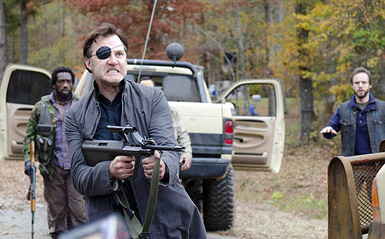By: Dan Raphaelson
As the third season finale of THE WALKING DEAD opened, the audience found themselves staring into the black abyss of The Governor’s one good pupil; appropriately foreboding imagery if, indeed, the eyes are the window to the soul. He would have us believe that his menace is justified, even righteous, as he claims his daughter may have survived were it not for his nasty habit of asking questions before shooting, but is this survivalist philosophy or a slick line from a self-made politician? Judging by the events to follow – particularly the roadside massacre of his own constituents – I’m inclined to believe the latter.
Still, the kill-or-be-killed philosophy that the governor alludes to is worthy of examination. Ever since the good ole’ days of Rich and Shane, the central conflict of the show seems to be a choice between protecting your own – your family, your crew, your town – and protecting those most in need. Rick, of course, is the resident softy; he even went back for Merle, though it may have left Lori a widow. Shane, quite the opposite, would sacrifice anything (or anyone) to keep himself alive and his “family” together. The Governor, particularly in this opening scene, seems to preach a corrupt extension of Shane’s philosophy; that not only should you pursue safety for your crew at all costs, but that you should enjoy the morbid course of duty.
In the episode’s most interesting development, Carl seemed to take a step towards The Governors take-no-prisoners way of thinking. When an enemy soldier surrendered and tried to hand over his gun, Carl gunned him down in cold blood, later explaining to his father that he just couldn’t take the chance. After all, he notes, his father’s mercy has had deadly consequences on more than one occasion. It seems that the only way to differentiate between a perceived threat and an actual one is to get closer to it – to give it time, to give it a chance – and in a world where every decision is a matter of life and death, one can hardly blame a child for acting out of fear. When he drops his father’s badge, it feels like he’s dropping the mantle of the peacekeeper, taking up instead that of the judge, jury, executioner and, god forbid, governor.
Taking the show’s increasingly ambiguous, delightfully challenging morality a step further, the creative minds behind it have punished poor Andrea for adhering to Rick’s relatively pacifistic philosophy. As she said so many times, she just didn’t want anyone to die, but was showing The Governor mercy in fact merciful? She certainly wasn’t herself a favor, nor The Governor’s future victims. Yet again, THE WALKING DEAD assures us that their world is no more fair than ours; you don’t earn your survival by doing the right thing.
I could go on and on about what worked and what didn’t (loved Daryl’s brief, tight-lipped mourning, hated Andrea’s slow-poke escape attempt), but for me the greatest take-away from this episode was more of a question than an answer: if one path might rob you of your soul, but the other path might rob you of your life, which do you take? Is it better to lose your humanity, or to lose your humanness?
Daniel Raphaelson is a self-proclaimed genius, widely recognized egotist and avid collector of useless degrees in cinema studies. Follow him on Twitter @WagTheWatchdog.

